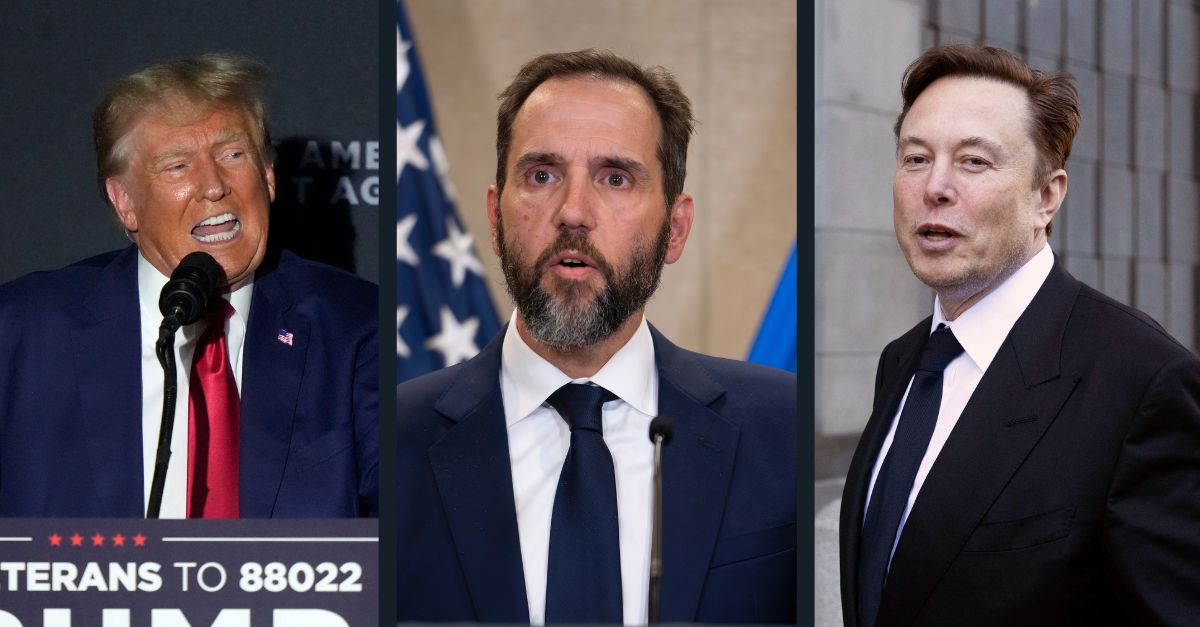
Left: Former President Donald Trump speaks at a campaign rally in August 2023 (AP Photo/Robert F. Bukaty). Center: Special counsel Jack Smith speaks to the media about an indictment of former President Donald Trump in August 2023 (AP Photo/J. Scott Applewhite, File). Right: Elon Musk leaves a federal courthouse in San Francisco, in January 2023 (AP Photo/ Benjamin Fanjoy, File).
Months after Elon Musk's X Corp. urged the justices of the U.S. Supreme Court to find that special counsel Jack Smith unlawfully forced the social media microblogging site formerly known as Twitter to hand over evidence of former Donald Trump's "private communications" without the former president's knowledge of the Jan. 6 probe-related action, the high court on Monday refused to take up the case and offered no explanation for the denial.
Within the 50-page orders list and a section cataloguing the cases denied certiorari was X Corp. v. United States, a now failed petition that was brought in late May. As Law&Crime reported at the time, X and Musk had argued that Smith orchestrated an "unprecedented end-run around executive privilege" and the First Amendment to keep Trump unaware — through a 180-day nondisclosure order — of a warrant seeking private messages his @realDonaldTrump account sent and received.
The petition from X asked the justices to answer two questions:
1. Whether an electronic communications service provider can be compelled to produce potentially privileged user communications before adjudication of the provider's First Amendment challenge to a nondisclosure order that prohibits it from notifying the user and before the user had notice and an opportunity to assert privilege, including executive privilege.
2. Whether the First Amendment permits gagging a provider in a highly public investigation where the government does not (a) demonstrate that disclosure would jeopardize the investigation's integrity; or (b) dis- prove the workability of a less-restrictive alternative, such as disclosure to a representative designated by a former President to assert executive privilege on his behalf.
The justices confirmed Monday that they will answer neither of these questions.
In July, special counsel Smith responded by saying the X's petition, advancing an "abstract and unfounded privilege claim and idiosyncratic facts," was no reason to to rethink the "standards" that govern warrants under the Stored Communications Act moving forward; under the act, there is a mechanism for obtaining the nondisclosure order that X challenged.
The special counsel, noting that Twitter was fined $350,000 for "not fully comply[ing] with the warrant until after the [district] court's deadline," said the X petition lacked "merit" and "warrant[ed] no further review."
"The first claim misapprehends the requirements of the SCA and the First Amendment; erroneously seeks to inject unfounded executive-privilege claims into its argument; and wrongly asserts a circuit conflict. The second claim presents a factbound and meritless objection to the ruling of both courts below upholding the nondisclosure order," the government said. "Even if the issues petitioner raises otherwise warranted review, this case would not be an appropriate vehicle: the underlying dispute is moot and no executive-privilege issue actually existed in this case. If review of the underlying legal issues were ever warranted, the Court should await a live case in which the issues are concretely presented. The petition for a writ of certiorari should therefore be denied."
Comments